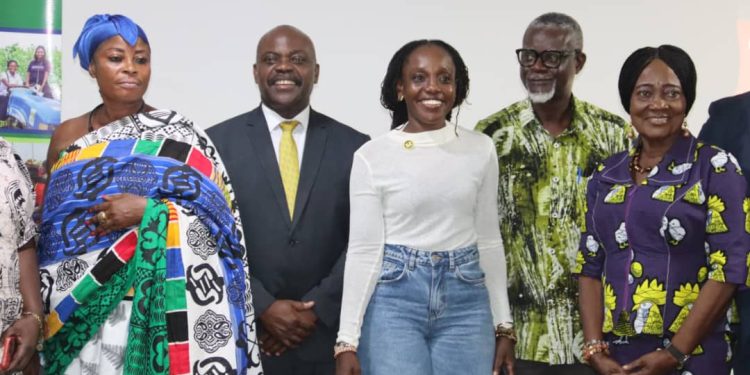5th Ghana Poultry Day Festival to Drive Job Creation, Agri-Tourism, and Food Security

Agrihouse Foundation has officially launched the 5th edition of the Ghana Poultry Day Festival, an annual initiative committed to transforming Ghana’s poultry industry through advocacy, education, celebration, and the promotion of local poultry consumption. This year’s festival , scheduled for Tuesday, July 1, 2025, at the Forecourt of the State House in Accra. under the […]
5th Ghana Poultry Day Festival to Drive Job Creation, Agri-Tourism, and Food Security

Agrihouse Foundation has officially launched the 5th edition of the Ghana Poultry Day Festival, an annual initiative committed to transforming Ghana’s poultry industry through advocacy, education, celebration, and the promotion of local poultry consumption. This year’s festival , scheduled for Tuesday, July 1, 2025, at the Forecourt of the State House in Accra. under […]
Agrihouse Foundation Successfully Hosts Second Edition of Ghana Agrochemicals and Crop Protection Exhibition and Awards

Agrihouse Foundation has successfully organized the second edition of the Ghana Agrochemicals and Crop Protection Exhibition and Awards (GACA) at the Techiman Community Center. The two-day event, themed “Sustaining the Climate and the Environment: The Role of Input Dealers,” provided a platform for industry players in agriculture to explore modern farming technologies and sustainable practices […]
Agrihouse Foundation strengthens farmer-input dealer relations through 2nd GACA

Agrihouse Foundation has successfully hosted the second edition of the Ghana Agrochemicals and Crop Protection Exhibitions and Awards (GACA) at the Techiman Community Center. The two-day event, held under the theme “Sustaining the Climate and the Environment: The Role of Input Dealers,” aims to provide industry players in the agricultural sector with a platform to explore cutting-edge […]
GML Green Energy Champions Sustainable Agriculture Through Strategic Partnership with Agrihouse Foundation for 2nd Ghana Agrochemicals and Crop Protection Exhibition and Awards (GACA)

GML Green Energy Ghana has partnered with Agrihouse Foundation to support the 2nd Ghana Agrochemicals and Crop Protection Exhibition and Awards (GACA), reinforcing a shared vision for sustainable agriculture, climate resilience, and the responsible use of agricultural inputs. This collaboration highlights a commitment to equipping Ghanaian farmers with innovative, eco-friendly solutions that enhance soil health, […]
2nd Ghana Agrochemical and Crop Protection Exhibitions and Awards (GACA) Slated for March 27-28, 2025

Agrihouse Foundation is set to host the second edition of the Ghana Agrochemical and Crop Protection Exhibitions and Awards (GACA) on Thursday, March 27 to Friday, March 28, 2025, in Techiman at the Techiman community Center in the Bono Region. speaking at the press briefing , the General Manager for Operations at Agrihouse Foundation,Mr Michael […]
Agromonti Renews Partnership with Agrihouse Foundation for 2nd Ghana Agrochemicals and Crop Protection Exhibitions and Awards

Agromonti, a leading agrochemical company, has reaffirmed its commitment to promoting responsible and sustainable farming practices by partnering with Agrihouse Foundation for the second time to host the 2nd Ghana Agrochemicals and Crop Protection Exhibitions and Awards. The event is set to take place at the Techiman Community Center from Thursday, March 27th to Friday, […]
Collective Action Needed to Advance Women’s Empowerment in Agriculture

Dr. Zanetor Agyeman-Rawlings, Member of Parliament for the Korle Klottey Constituency and Patron of the Gathering of the Royals, has reiterated the urgent need for a collaborative and strategic approach to empowering women, particularly in the agricultural sector. Speaking at the 7th Gathering of the Royals and the Nana Konadu Agyeman-Rawlings Legacy Honours, organized by Agrihouse […]
Nana Konadu Agyeman-Rawlings Calls for Bold Reforms to Empower Women in Agriculture

Former First Lady, Nana Konadu Agyeman-Rawlings, Has Called For Urgent Structural Reforms To Eliminate Barriers That Hinder Women’s Full Participation In Agriculture. Speaking At The Seventh Edition Of The Gathering Of The Royals And The Nana Konadu Legacy Honours And Awards, Organized By Agrihouse Foundation, She Emphasized The Need For Targeted Interventions To Empower Women To Lead And […]
Capt. Georgina Jopap and Victoria Remi Nkong Honored with Inaugural Nana Konadu Agyeman-Rawlings Legacy Honours at the 7th Gathering of the Royals

The 7th Gathering of the Royals and Nana Konadu Agyeman-Rawlings Legacy Honours, organized by Agrihouse Foundation, celebrated the achievements of exceptional women in leadership and development. Held at the GNAT Hall in Accra under the theme, “Honouring Leadership, Inspiring Hope, and Delivering Agri-Jobs Through the Royals in AgriBooster Dignified Community-Level Network Initiative,” Captain Georgina Jopap […]
